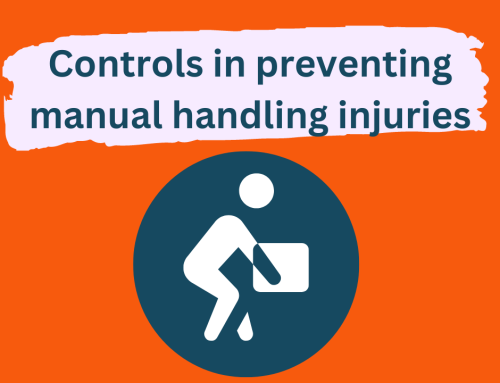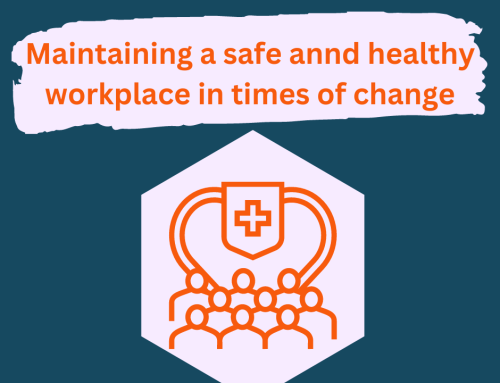This series of blogs is developed from the leaflet provided by the Mental Health Foundation to encourage you to think more about mental health in the workplace and inform you what you can do to take steps to creating an environment where staff feel safe and supported.
Having a fulfilling job can be good for your mental health and general wellbeing.
For most of us, work is a huge part of our lives. It is where we spend a lot of our time, where we get our income and often where make our friends.
We all have times when life gets on top of us – sometimes that’s work-related, like deadlines or travel. Sometimes it’s something else – our health, our relationships, or our circumstances.
It’s vital that we protect that value by addressing mental health at work for those with existing issues, for those at risk, and for the workforce as a whole. A toxic work environment can be corrosive to our mental health.
After reading these blogs you should have an idea of how to manage your own mental health at work, how to reach out to a colleague in distress and have an idea how you can work with others to make your workplace more mentally healthy for everyone.
Check out the other blogs in the series, what is mental health? and 10 ways to improve your mental health.
_________________
While discussing mental health might seem intimidating, we have all had talks with others about bereavements, breakups, and other life events. While these conversations don’t always start well, they frequently mean a lot to someone going through a difficult time.
It all begins with openly and warmly asking someone how they are doing, giving them an opportunity to realise that you are being amiable and honest.
When it comes to discussing with someone about their mental health, it is advisable to choose a time and location that is convenient for them. There is a time and place for everything.
Rushing is the last thing anyone needs. Choose a time when you are confident that you have at least 10 minutes to spare. You might wish to schedule a lengthier conversation, perhaps outside of work hours or, if suitable, within work hours. You should find a place that will be comfortable for them. Some individuals like quiet surroundings, while others enjoy busy environments.
Giving the individual you are reaching out to your complete attention is crucial. That entails reducing interruptions like phones ringing and pop-up notifications. Every relationship benefits greatly from listening.
The phrase “active listening” refers to a variety of strategies for staying attentive and involved in a discussion.
- Unless the person you are speaking to doesn’t appear to mind, try to maintain eye contact.
- Be open, which entails holding out your arms and leaning in their direction.
- Recognize what is being said with the proper nods and gestures, and repeat what they said to make sure you understood it correctly.
- Ask straightforward, pertinent questions; nevertheless, it’s not appropriate to press a person for more information than they are willing to provide.
- Summarize your discussions and agreements after the conversation is over, then follow through on your commitments.
- It might be beneficial to have some knowledge on hand.
Put several hotlines and websites on your phone so you can share them right away.
It might be tough to hear sad or challenging things, but you want to comfort and support the individual, so you shouldn’t act surprised or judgmental. You want to reassure the person that speaking to you is acceptable and that you will respect what they have to say. It is alluring to provide answers to issues right away, but it is better to first ask someone what they want to happen. They could be open to recommendations, but they might just need to vent.
How do I respond to thoughts of suicide?
The idea that discussing suicide makes it more likely is untrue. It is preferable to approach a co-worker directly if you are worried that they may be considering suicide. During a discussion about someone’s mental health, you might inquire, “Have you had thoughts of suicide? Avoid euphemisms like “You wouldn’t do anything dumb, would you?” and instead be direct. Encourage your co-worker to get treatment if they admit to feeling suicidal or unable to continue, or if you have any reason to believe they are considering suicide.
They could contact the Samaritans straight away – they can call 116 123 for free. You could also help them to call their doctor or a close friend or colleague. If you are concerned for someone’s immediate safety, or they tell you that they plan to end their life imminently, you can call 999 and ask for the police or take them to an A&E Department.
How can I support a person with ongoing mental health problems?
If they have the proper assistance from the people in their lives, the majority of people who experience mental health issues recover well.
An episode of mental illness may be a one-time thing for some people, brought on by external factors. There might even be no cause at all. Others may experience chronic or long-term episodic mental health issues. Recovery is different from curing; frequently, people learn to live with certain features of their mental health issue. Supporting a co-worker with a mental health issue include helping them find methods to recover, assisting them in maintaining their health, and ensuring that the workplace is a welcoming environment free from prejudice.
Remember that the best expert on a person’s needs is themselves – if there is one golden rule for supporting a colleague, it is never to assume and always ask.
How can I support someone if they are off work?
Many people who struggle with mental health issues dread going back to work after being off due to illness. Knowing what to say when someone has been ill can be hard, especially if it has never been discussed or if their behaviour was atypical when they were ill. Maintaining contact and letting someone know you care, whether you are a boss or a co-worker, is a terrific approach to avoid embarrassment.
You could:
- Ask the person who is off work what information they would like their co-workers to know. Remind co-workers that a person’s public persona—which may include social media—might not accurately represent who they truly are.
- Ask them out when the crew is having fun together; even if they say no, they will appreciate the invitation.
- If you would typically socialise with your co-worker, send cards and give them a call, just as you would if they had any other health issue.
- Call them a few days before they go back to work and inquire if there is anything you can do for them (maybe give their desk a tidy, agree to meet for coffee and walk in together, or go for lunch on the first day).
- When they return, greet them. They probably won’t want a fuss created, but you shouldn’t be afraid to mention their absence. Inquire about their well-being and see if there is anything you can do to help them now and in the future.
- Help them get back into work routines – ask if they would like your support or attendance at meetings.
How can I support someone day-to-day?
Many people who struggle with mental health issues overcome their challenges and go back to their previous way of life. This cannot always be assumed. People with mental health issues may need to make long-term or permanent changes to their life or occupations in order to cope, similar to many long-term health ailments. Colleagues can require your continued help; do not treat them differently than others or think that everything is great just because some time has passed.
You could:
- Informally check in with co-workers to see how they are doing, and if you oversee someone, give them the opportunity to talk about their mental health during supervision meetings.
- You may volunteer to provide continuing friendly support, serve as a mentor or coach, or both.
- If there is anything you can do to help a person manage their disease, you can ask. For instance, they could ask you to assist them identify warning indications that they might overlook that they might be getting sick.
Line Manager responsibilities
You have a key role to play as a line manager in helping employees who are struggling with discomfort or mental health issues. Since you are the employee’s initial point of contact with the company, you have the power to set the tone and serve as an example.
Along with the advice for helping colleagues, there are a few things that line managers in particular need to be aware of.
Managing absence and return to work
You will be in charge of handling an absence as a manager. The longer a person is absent due to a mental health issue, the less probable it is that they will return. Returning can be facilitated by early and appropriate interaction. A “statement of fitness to work” (also known as a “fit note”) will be provided by the GP if you need a medical certificate from a physician. You should be able to determine whether you need to make any appropriate alterations as a result. A phased return to work, when someone works a few hours per day and gradually increases their hours worked, can occasionally be beneficial. Ask your HR manager or an occupational health specialist for guidance if you’re unclear about what constitutes reasonable.
For external advice, the conciliation service Acas provides a range of resources on managing challenging circumstances at work.
Performance management and appraisal
Regular team meetings and private supervision sessions between managers and their workers are said to be beneficial to company and to employee engagement.
This type of supervision is beneficial for both worker engagement and mental wellness. Sometimes a staff member’s performance can dwindle subtly or become more blatant, which is a symptom that they may be in trouble. It is advisable to have an open mind when deciding whether to use a disciplinary or competency procedure and to ask yourself if a mental health issue could be involved.
Unacceptable behaviour and subpar performance must undoubtedly be handled, but be mindful that fear may keep someone from speaking up about a mental health issue until their employment is in danger. Just because a staff member has mental health concerns shouldn’t stop you from adopting disciplinary or competency rules as necessary; nevertheless, these policies should account for health and disability-related issues.
For persons who have suffered with mental health issues, evaluations and job growth can be quite difficult. If your self-esteem is low, it may be challenging to identify your abilities, and it may be challenging to accept feedback, whether it be favourable or negative. A person could experience shame or dread if they haven’t been doing as well as they usually do. Be truthful when rating their performance since they could think it’s worse than it actually is.
It may be advantageous to decide in advance how to manage any lingering issues. Encourage your co-worker to discover potential contributing elements and think through possible solutions. Additionally, you might want to decide on the best crisis management strategy and any long-term changes that could be made to the position.
Leading during change
The nature of work is evolving, and many companies feel the need to restructure their businesses, make layoffs, or modify employee contracts or working conditions.
The mental health of employees is an issue throughout any transition process.
By making sure that decisions are communicated clearly, that people have as much time as is practical to process decisions, and that support is made available both within the workplace and through external support like employee assistance programmes and support for finding new employment, you can mitigate some of the obviously stressful aspects of planning a change process.
Change procedures can be extremely distressing for persons who have personal experience with mental health issues. They could anticipate being laid off, require further assistance, get sick, or, on the other hand, decide not to apply for promotions when they are qualified. When contemplating a change, it is important to take into consideration any staff members who have a history of mental health issues.
_________________
Access the full guide on supporting mental health at work here and see NIG Risk Assist for more information regarding health & safety at work.
Talbot Jones Ltd is a family-run Chartered Insurance Broker specialising in Third Sector and Professional risks. Get in touch for free insurance advice, review or quotation.
Talbot Jones Ltd incorporates March Insurance Services, a Chartered Insurance Broker specialising in Agricultural and Hospitality Risks.





